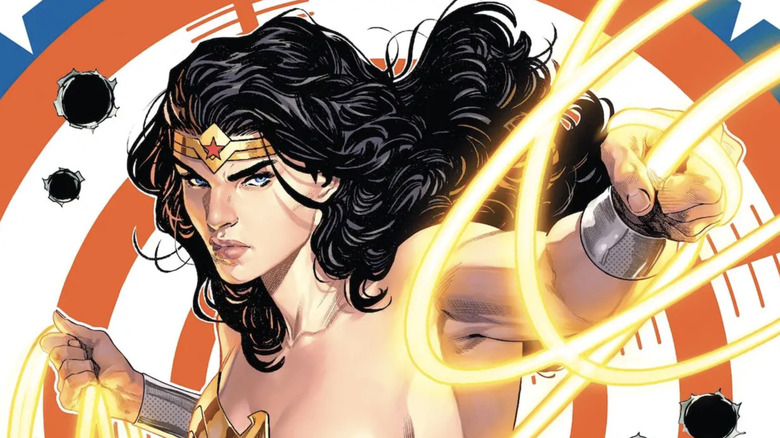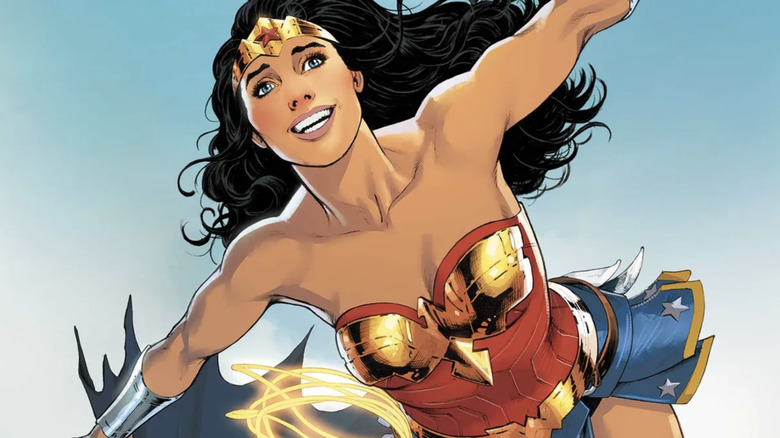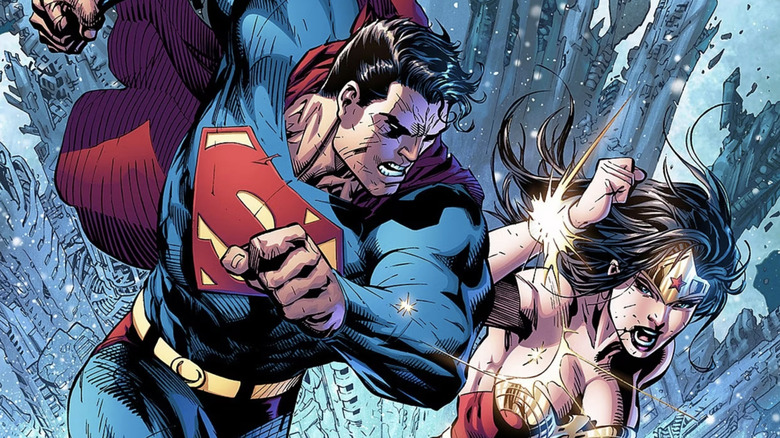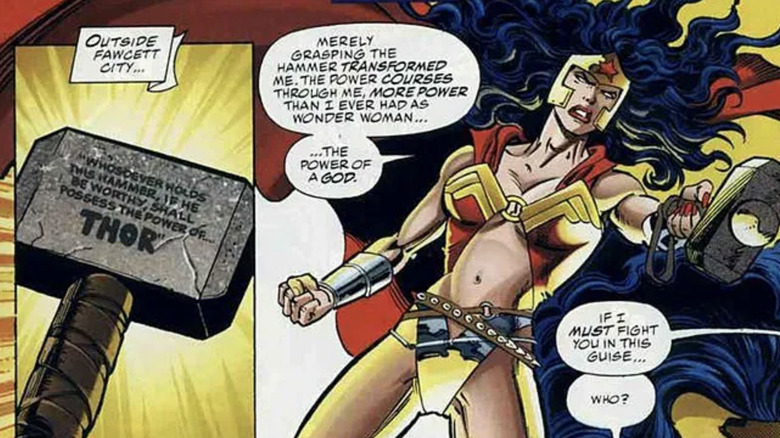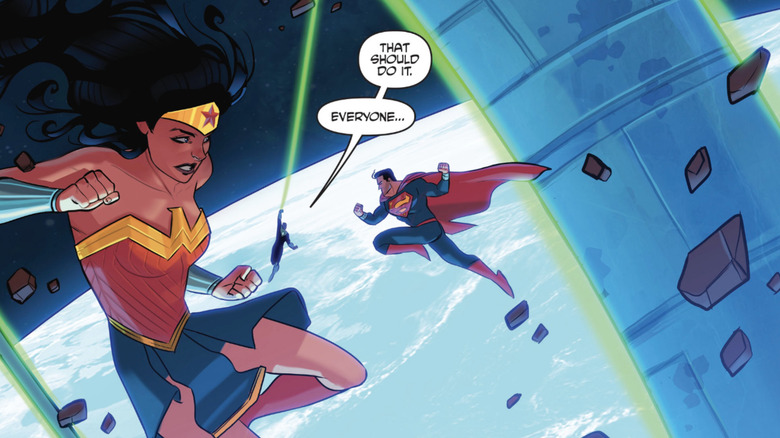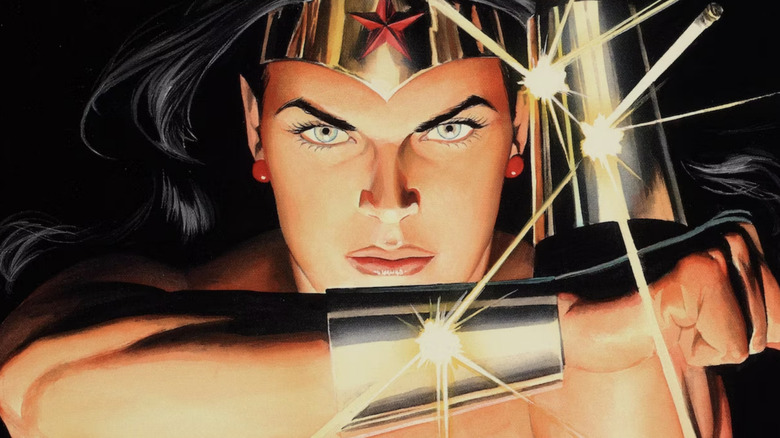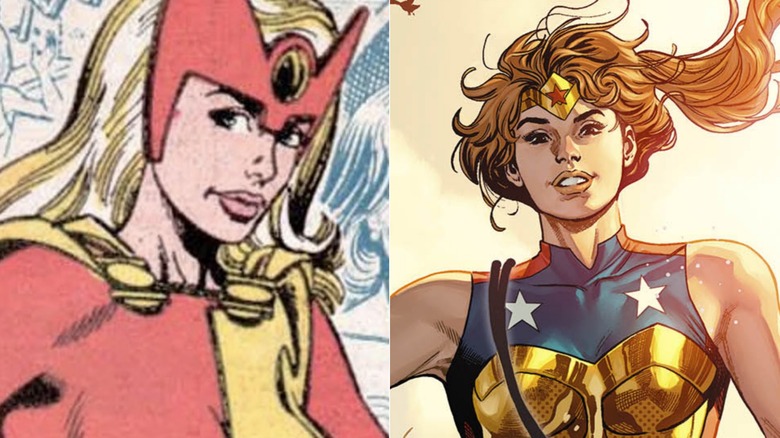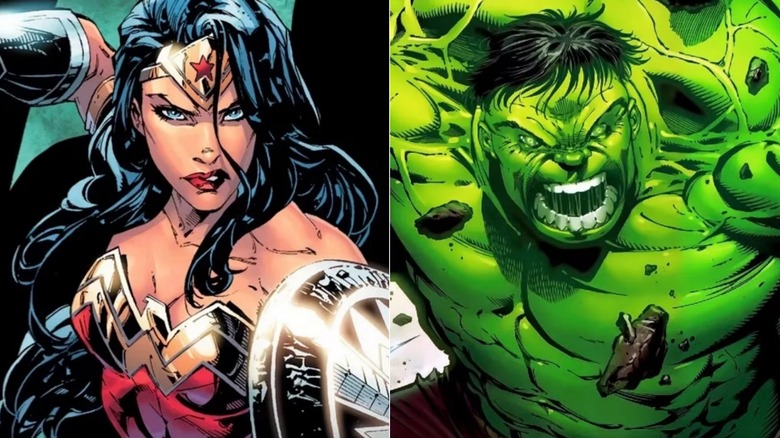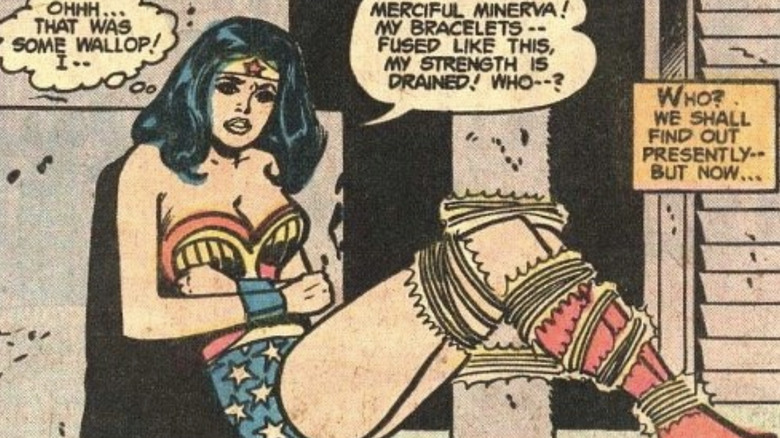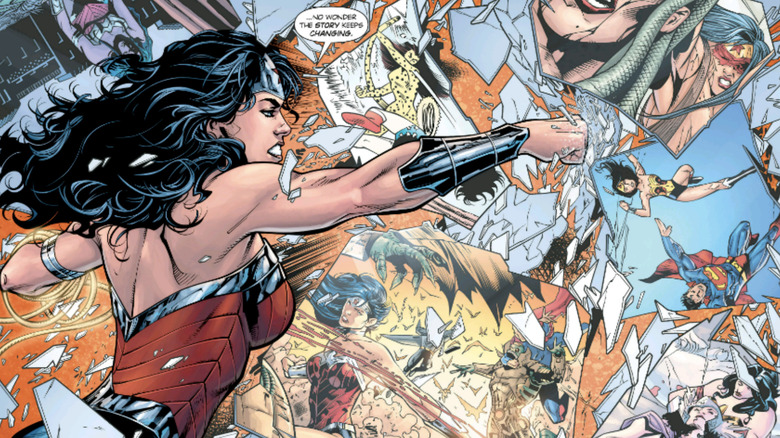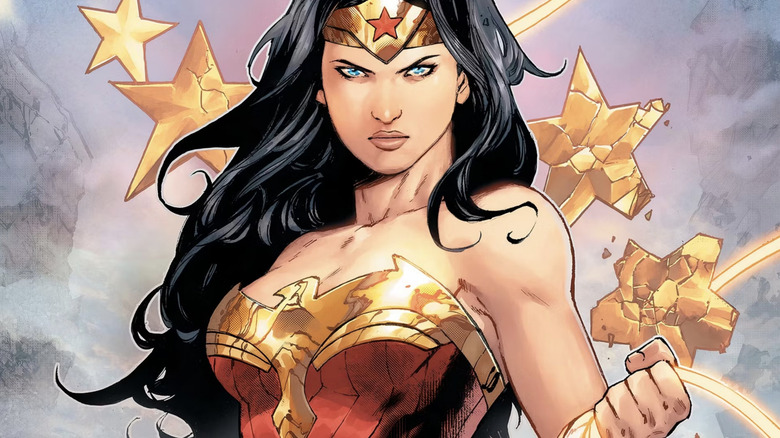Can Wonder Woman Fly? 10 Good Questions About DC's Strongest Female Hero, Answered
As one of DC Comics' oldest and most prominent superheroes, Wonder Woman is just as vital to the brand as Superman and Batman. First appearing in 1941's "All Star Comics" #8 before her official debut in "Sensation Comics" #1 a few months later, Wonder Woman has fought for truth and justice on her own terms for over 80 years. With a rich comic book history that includes multiple origins, various rogues, and her placement in the DC Universe's two foremost superhero groups — the Justice Society of America and the Justice League of America — it seems like there's nothing Princess Diana of Themyscira can't do. Or is there?
Because of her often complicated mythos, which mix Greek legends with DCU material, its unavoidable that certain questions would come up concerning the Amazing Amazon. Can Wonder Woman actually fly? How powerful is she really? What about her weaknesses? These are some of the most often asked questions about the Goddess of Truth, and we've got some answers.
Can Wonder Woman fly?
There's been plenty of debate over the years concerning whether Wonder Woman can actually fly or not, especially given the character's inconsistent abilities throughout history. If she has an Invisible Jet, why would she need to fly? Well, in Wonder Woman's first appearances, much like Superman, she actually couldn't fly. In the Golden and Silver Ages of comics, Wonder Woman primarily used her Invisible Jet (known then as her Invisible Plane) to travel great distances. Though she could jump higher than most superheroes due to her impressive super strength, she couldn't propel herself on her own. At one point, she learned to ride wind currents, but it only simulated flight for brief distances.
It wasn't until after the infamous "Crisis on Infinite Earths" event that Wonder Woman's origins (and powers) were revised. In George Pérez's "Wonder Woman" (Vol. 2) series, he granted Diana with both superhuman speed and flight through connection to the Greek god Hermes. From here on, Wonder Woman has generally been portrayed as being able to fly, as seen on episodes of the "Justice League" cartoon series. It wasn't until the 2011 "New 52" reboot that Diana, once again, was grounded, but even that proved temporary. Though she wasn't able to fly initially, she eventually gained the ability again via contact with Hermes' feather in "Wonder Woman" (Vol. 4) #12. Following the DC Rebirth reboot, she continues to soar through the clouds.
Is Wonder Woman stronger than Superman?
Inevitably, no matter which superhero exists out there, someone will always ask if they can beat Superman. Given that the Man of Steel is able to lift 200 quintillion tons in some continuities (via "All Star Superman") or bench press the weight of the entire Earth in others, per "Superman" (Vol. 3) #13, it's hard to imagine that anyone could really take him on. Of course, because Diana has been granted the powers of Earth by the goddess Demeter (at least in some versions), it's been asserted that Wonder Woman is as strong as the planet itself. This means that Superman and Wonder Woman are, generally speaking, on pretty equal footing, even if the Man of Steel might be just a bit stronger.
Despite that, Diana would certainly be able to put up a fight, and, indeed, she has. When Superman was under Maxwell Lord's telepathic control in "Superman: Sacrifice," Diana challenged the mind-controlled Man of Steel in mortal combat. Eventually, she broke Kal-El from Lord's influence, ending the conflict. Of course, because these two are friends, they don't fight too often. When they do, both are usually holding back to keep from truly harming the other. In "JLA: A League of One," Wonder Woman notes that she couldn't beat Superman in straight combat, and thus backed down from the fight. Still, she's not a heroine to be trifled with.
Can Wonder Woman lift Thor's hammer?
Another common question asked among comic book fans is whether or not their favorite superhero would be able to lift Thor's hammer, Mjolnir. Marvel fans all know the phrase, "Whosoever holds this hammer, if he be worthy, shall possess the power of Thor." So, is Wonder Woman worthy? Aside from the fact that Diana hails from the DC Universe and Thor exists in the Marvel Universe, one of the biggest comic book crossovers actually reveals the shocking truth. Penned by Ron Marz and Peter David in the mid-'90s, "DC vs. Marvel" proves that Diana is truly worthy to wield Mjolnir, which in turn gives Wonder Woman one of the worst costume redesigns we've ever seen. Thankfully, Wonder Woman returned to her original look soon after.
Strangely enough, this crossover was actually canon, especially within the Marvel Universe. Wonder Woman's ability to lift Mjolnir was later referenced in 2019's "Thor: The Worthy" #1, right alongside Superman's own tenure with the hammer from the later "JLA/Avengers" crossover. It's clear that Diana is indeed worthy, but not just in the Marvel Universe. In 2021's "Wonder Woman" (Vol. 1) #773, Diana battles DC Comics' version of Thor with his own hammer. Not only does Diana quickly defeat the God of Thunder with his own weapon, but she then breaks the hammer into pieces right in front of him.
Can Wonder Woman survive in space?
As with Wonder Woman's power of flight, Diana's ability to survive in outer space is dependent on the version we're talking about. With comic books, superheroes' powers and abilities are often either highlighted or downplayed depending on the story's needs and the current continuity's general rules. Originally, Wonder Woman used her Invisible Jet to soar into the far reaches of space, as she was unable to fly above the Earth. However, even during the Golden Age, it appeared that Wonder Woman could survive in outer space, even if she couldn't fly there on her own power. Issues like "Wonder Woman" (Vol. 1) #99 see Diana float in space without the use of any protective equipment, talking as well as breathing.
On more than one occasion (including the image above), we've seen Wonder Woman not just survive in space, but thrive. This has generally been true of all modern incarnations of the character — likely due to her demigod status as an Amazon — and something we've seen in most animated adaptations. Of course, there are some issues, such as "Wonder Woman" (Vol. 2) #66, that downgraded the character's abilities, putting the Mighty Amazon in a space suit, but the vast majority of stories have proven otherwise.
Is Wonder Woman bulletproof?
Another common question concerning DC's Amazon Princess is whether or not she's bulletproof. Now, we all know that her enchanted Bracelets of Submission are able to deflect bullets at will. Given that Wonder Woman has incredible speed bestowed upon her by Hermes, her bracelets have kept herself and others from being shot on more occasions than we can count. Some of the coolest live-action Wonder Woman moments in both "Wonder Woman" and "Justice League" revolve around her using these bracelets for just this purpose. But, without them, can Diana be shot? Well, it depends. Generally speaking, Wonder Woman's skin is pretty durable, but it's not bulletproof.
In her first appearance in "All-Star Comics" #8, Diana is told to either deflect bullets or expect to be shot. This was true throughout most continuities, and has been expressly the case in the modern DC Rebirth continuity. Diana was shot by a sniper in 2017's "Wonder Woman" (Vol. 5) #19, and was hurt by a ricochet in 2018's "Justice League" (Vol. 3) #42. Usually, she's also vulnerable to sharp weapons, especially those of the magical variety. But elsewhere, DC has proven inconsistent in Wonder Woman's durability. In 1992's "Wonder Woman" Special (Vol. 2) #1, Deathstroke shoots Diana at close range, but she is barely slowed down. Likewise, in other non-canon series, such as "Sensational Comics Featuring Wonder Woman" and "Injustice: Gods Among Us," Wonder Woman has been seen walking off an array of bullets without a scratch.
Can Wonder Woman have kids?
The short answer to the question if Wonder Woman can have children of her own or not is an emphatic "Yes!" As early as the Golden Age, the original Wonder Woman eventually married U.S. soldier Steve Trevor, and the pair got busy. Their daughter, Hippolyta "Lyta" Trevor, first appeared in "Wonder Woman" (Vol. 1) #300, where she became the superhero Fury. Eventually, she helped start the superhero group Infinity, Inc., which consisted of many of the children of the original Justice Society of America. Of course, "Crisis on Infinite Earths" eventually retconned both Wonder Woman's marriage and Fury's parentage, erasing these original Golden Age characters, but Lyta isn't Diana's only in-continuity child.
More recently, DC unveiled a new daughter for Wonder Woman, a young woman named Elizabeth "Lizzie" Prince, aka Trinity. First appearing in 2023's "Wonder Woman (Vol. 1) #800, Trinity is the future daughter of Diana and some unknown father. The jury's still out regarding Trinity's true origins, whether she'll exist in the present timeline, or if she's even Diana's biological daughter at all, but she continues a tradition of legacy heroes that has included Damian Wayne's Robin and Jon Kent's Superman. Other timelines and continuities have given Diana biological children as well, most often with Superman as the father.
Can Wonder Woman defeat Hulk?
When it comes to pitting superheroes against one another, we often see folks wondering if their favorite hero could defeat the Hulk. It's a hard question because the Hulk is pretty unpredictable, and like many other comic book characters, his power levels depend on who is writing him. As we've seen, the same is true of Wonder Woman. But could Wonder Woman defeat the Hulk? Presumably. The Hulk's greatest strength is that the angrier he gets, the stronger he gets. So in pure hand-to-hand combat, it's hard to tell who would win. Superman won against the Hulk in "DC vs. Marvel," but as we previously established, Superman could theoretically overpower Wonder Woman also.
Of course, Wonder Woman has also defeated Superman, and so it stands to reason that she could beat the Hulk. Diana has one major advantage here: her weapons. Wonder Woman's Lasso of Truth has been known to calm down those under its spell, and she also wields a sword in most modern continuities — such as the God Killer in the "Wonder Woman" movie or the Sword of Athena. With these weapons (and considering her temporary status as the God of War from the New 52), it's feasible that Wonder Woman could disarm, defeat, and even kill the Hulk, at least before he resurrected again.
Does Wonder Woman have a weakness?
Unlike Superman, whose aversion to Kryptonite can get him into trouble, Wonder Woman doesn't have a standard weakness. Sure, she can be harmed by bullets, swords, or other weapons, but so can Batman. So what's Diana's Kryptonite? Well, magic usually does the trick. Because her Lasso of Truth is unbreakable, many early "Wonder Woman" comics had villains tie up the Amazing Amazon in her own ropes. While usually she's on the other end of such humiliation, she occasionally found herself dispatched by her own enchanted thread.
Diana's aptly named Bracelets of Submission could also be used against her in the proper context. According to Diana herself in "Wonder Woman" (Vol. 1) #2, "When an Amazon permits a man to chain her Bracelets of Submission together, she becomes weak as other women in a man-ruled world!" While this weakness hasn't been utilized by her opponents too often past the Golden Age, it was a weakness that could strip Diana of her powers. Additionally, when not wearing her trademark tiara, Wonder Woman can be vulnerable to telepathic attacks and mind control, but that rarely comes into play since Diana is almost always wearing her crown.
Is Wonder Woman human?
If you didn't know by now, Wonder Woman is not a human being. She isn't called the Amazing Amazon for nothing. While Wonder Woman's origins are a bit convoluted, she has always been one of the mythic Amazons. In the traditional origin story, Diana was crafted from clay by her mother, Queen Hippolyta, and granted life by the gods who honored Hippolyta's request. In addition to giving Diana life, the gods imbued her with superhuman powers, and she eventually arrived in "man's world" as Wonder Woman to defend all life.
Though the New 52 relaunch retconned Wonder Woman's origins, making her the biological daughter of Hippolyta and Zeus (a change the DCEU opted to include in its canon), the DC Rebirth revamp backtracked on that idea. Though Hippolyta and Zeus were evidently still involved, it seems as if Diana was once again made from clay rather than being born as a biological god, at least according to "Wonder Woman" (Vol. 5) #2. In either case, Wonder Woman is still not a human being, though she looks human in appearance. Some stories have allowed her to set aside her powers and effectively become human (more on that in a moment), but generally speaking, she is a demigod warrior princess to her core.
Can Wonder Woman die?
As an Amazon, Wonder Woman doesn't age the same way human beings do, leading many to wonder if Diana can even die at all. Of course, like nearly every question about comic book continuity, that depends on whoever DC has writing their latest stories. For instance, the original Golden Age version of Wonder Woman (later called the Wonder Woman of Earth-Two) eventually married Steve Trevor, had a daughter, and settled down. In this version's last official appearance in "Infinite Crisis" #5, she appeared much older than her younger self.The original Wonder Woman effectively became human in order to live a normal life, and aged as a result before being taken to Mount Olympus.
But generally speaking, Wonder Woman does not age the way we do due to her rapid healing abilities. Most consider her immortal because of her semi-divine nature. We see this in Gal Gadot's portrayal of Wonder Woman, as she looks the exact same no matter if she's on the battlefield during World War I, prancing around the '80s, or with the Justice League in the 21st century. Of course, just because Wonder Woman could live forever doesn't mean she can't die. In fact, she has died on a few occasions in the comics. Most famously, Wonder Woman was killed and sent to hell by the demon Neron in "Wonder Woman" (Vol. 2) #125, but she resurrected soon after. Likewise, she died at the end of "Dark Nights: Death Metal" #7, but later returned to life after her own journey through the Sphere of the Gods. Wonder Woman can die, she just rarely stays dead.
